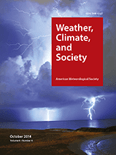
Weather Climate and Society
Scope & Guideline
Bridging Atmospheric Science and Social Dynamics
Introduction
Aims and Scopes
- Climate Change Impacts and Adaptation Strategies:
Research on the impacts of climate change and strategies for adaptation in various sectors, including agriculture, health, and urban planning. - Weather Communication and Public Perception:
Studies on how weather information is communicated to the public and how perceptions of weather and climate influence individual and community behaviors. - Societal Vulnerability and Resilience:
Analysis of how different communities are affected by and respond to weather events, focusing on social inequalities and resilience-building measures. - Integrating Indigenous Knowledge and Practices:
Exploration of how traditional ecological knowledge can inform climate adaptation and resource management strategies. - Technological Innovations in Meteorological Services:
Evaluation of new technologies and methodologies in weather forecasting and climate services, including the use of big data and machine learning.
Trending and Emerging
- Climate Justice and Equity:
There is a growing emphasis on research that examines the intersection of climate change with social justice, highlighting the disparities in vulnerability and access to resources. - Health Impacts of Climate Change:
An increasing number of studies focus on the direct and indirect health effects of climate change, including the impacts of extreme weather events on public health outcomes. - Community-Based Resilience and Adaptation:
Research that emphasizes community engagement and local knowledge in developing climate adaptation strategies is gaining traction, reflecting a bottom-up approach to resilience. - Data-Driven Decision Making:
The integration of big data analytics and machine learning in weather forecasting and climate service delivery is emerging as a significant trend, enhancing predictive capabilities and user engagement. - Interdisciplinary Approaches to Climate Solutions:
There is a notable trend towards interdisciplinary research that combines insights from social sciences, environmental studies, and technology to address complex climate-related challenges.
Declining or Waning
- Historical Climate Analysis:
Research focused on historical climate patterns and their implications has become less prominent, possibly overshadowed by more immediate concerns of current climate impacts. - Purely Meteorological Studies:
There has been a noticeable decline in studies that focus solely on meteorological phenomena without considering their societal implications, as the journal increasingly emphasizes interdisciplinary approaches. - Traditional Risk Communication Models:
The use of conventional risk communication models appears to be waning, with a shift towards more nuanced and context-sensitive approaches that consider diverse audience perceptions.
Similar Journals
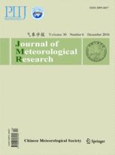
Journal of Meteorological Research
Your Gateway to Cutting-Edge Meteorological Insights.The Journal of Meteorological Research, published by SPRINGER HEIDELBERG, stands as a vital resource in the fields of Atmospheric Science and Ocean Engineering, boasting an impressive impact factor that reflects its scholarly significance. With its ISSN 2095-6037 and E-ISSN 2198-0934, the journal offers an open access platform, fostering accessibility and dissemination of cutting-edge research. Established in 2014 and running through to 2024, it is particularly distinguished in 2023 as Q2 in Atmospheric Science and Q1 in Ocean Engineering, underscoring its important contributions to these disciplines, with remarkable rankings in Scopus that place it in the top tiers of both categories. The journal accepts a broad range of research articles, reviews, and innovative methodologies, catering to a diverse audience of researchers, professionals, and students eager to advance their knowledge and expertise in meteorological studies. This makes the Journal of Meteorological Research an essential platform for anyone engaged in understanding and addressing the complex challenges of our changing climate.

Journal of Operational Meteorology
Exploring the Intersection of Science and ForecastingJournal of Operational Meteorology, published by the Natl Weather Assoc, is a pivotal resource in the intersecting fields of atmospheric science, computer science in earth sciences, and management science and operations research. With an ISSN of 2325-6184, this journal has established itself as a key player in operational meteorology, driving advancements in weather forecasting, climate modeling, and meteorological applications. Since its inception in 2019, it has garnered attention in various quartiles, ranking Q2 in both computers in earth sciences and management science categories, and Q3 in atmospheric science, indicating its growing influence in these disciplines. Researchers and practitioners alike benefit from its curated access to innovative methodologies, case studies, and theoretical insights that are crucial for advancing meteorological practices. Though it is currently not open access, the journal remains committed to disseminating essential research that informs both academic inquiry and practical application in the ever-evolving landscape of meteorology. With its base in the United States, the Journal of Operational Meteorology continues to attract contributions that reflect the latest trends and challenges in weather and climate research, making it an indispensable tool for those engaged in these vital studies.

Weather and Climate
Innovating Solutions for a Changing WorldWeather and Climate is a prestigious, peer-reviewed journal published by the Meteorological Society of New Zealand, dedicated to advancing knowledge in the domains of meteorology and climatology. With the ISSN 0111-5499, the journal serves as a vital platform for researchers and professionals to disseminate impactful findings that address pressing issues related to weather patterns and climate change. Although it does not operate on an open-access model, it provides a wealth of valuable insights drawn from a diverse range of studies. The significance of this journal in the scientific community is underscored by its commitment to fostering interdisciplinary collaboration and sharing innovative research that can inform policy-making and environmental management strategies. Located in Wellington, New Zealand, Weather and Climate not only contributes to regional meteorological discourse but also holds relevance for the global scientific landscape, making it essential reading for anyone invested in the future of our changing climate.

Atmosphere-Korea
Exploring Meteorological Insights for a Sustainable FutureAtmosphere-Korea is a prestigious journal published by the Korean Meteorological Society, dedicated to advancing the field of atmospheric sciences. With a focus on both theoretical and applied research, this journal encompasses a wide range of topics including meteorology, climatology, and environmental science, providing a platform for researchers to disseminate their findings and enhance scientific dialogue. Although currently not categorized under an open access model, the journal ensures that all articles meet rigorous scientific standards, thereby maintaining its credibility and academic integrity. The ISSN 1598-3560 and E-ISSN 2288-3266 identify its unique contributions to global knowledge in meteorology. Researchers, professionals, and students alike benefit from the invaluable insights offered through its publications, making Atmosphere-Korea an essential resource in understanding climatic phenomena and their implications for society.

Asia-Pacific Journal of Atmospheric Sciences
Advancing Knowledge in Meteorology and ClimatologyWelcome to the Asia-Pacific Journal of Atmospheric Sciences, a leading publication in the field of atmospheric science, published by the Korean Meteorological Society. With an ISSN of 1976-7633 and an E-ISSN of 1976-7951, this journal has been a cornerstone for researchers and practitioners in the atmospheric sciences since its inception in 2008. Recognized for its rigorous peer-reviewed articles, it holds a commendable Q2 quartile ranking in 2023 and is placed at the 51st rank out of 148 in the Earth and Planetary Sciences, reflecting its impact within the community with a 65th percentile. The journal features a broad scope encompassing meteorology, climatology, and environmental sciences, making it an essential resource for scholars and industry experts alike. As an open access journal, it ensures that groundbreaking research is widely accessible, fostering collaboration and innovation across the Asia-Pacific region and beyond. Explore the latest findings and advancements in atmospheric sciences and contribute to the dynamic field of climate research through the journal's engaging content.

JOURNAL OF HYDROMETEOROLOGY
Pioneering Research in Hydrometeorological ScienceJOURNAL OF HYDROMETEOROLOGY, published by the American Meteorological Society, is a leading scholarly journal that serves as a vital resource within the field of atmospheric science. With its ISSN 1525-755X and E-ISSN 1525-7541, this journal provides a platform for the dissemination of high-impact research, currently holding a prestigious Q1 ranking in Atmospheric Science as per the 2023 Category Quartiles. It enjoys an excellent reputation, ranked #30 out of 148 in the Scopus listings, placing it in the top 80th percentile within Earth and Planetary Sciences. Publishing rigorous and innovative studies from 2000 to 2024 and beyond, the journal addresses critical topics including weather forecasting, climate dynamics, and hydrological processes, making it essential reading for researchers, professionals, and students alike. Though not an open-access journal, it continues to enrich the academic community with quality contributions dedicated to advancing our understanding of hydrometeorological phenomena.
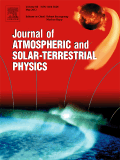
JOURNAL OF ATMOSPHERIC AND SOLAR-TERRESTRIAL PHYSICS
Advancing Knowledge in Atmospheric and Space SciencesJournal of Atmospheric and Solar-Terrestrial Physics, published by Pergamon-Elsevier Science Ltd, stands as a pivotal academic resource in the realms of Atmospheric Science, Geophysics, and Space and Planetary Science. With an ISSN of 1364-6826 and an E-ISSN of 1879-1824, this journal encompasses a robust collection of research findings and reviews that address the intricacies of atmospheric processes and solar-terrestrial interactions. The journal has shown consistent academic performance, earning commendable rankings in 2023, including Q3 in Atmospheric Science and Q2 in Geophysics, reflecting its importance for scholarly communication and advancement in these fields. Spanning an impressive convergence of research from 1997 to 2024, it aims to foster interdisciplinary collaboration and inspire innovations among researchers, professionals, and students. Although it currently does not offer open access, the journal is committed to disseminating high-quality content that continues to drive forward our understanding of complex environmental phenomena.
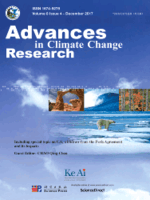
Advances in Climate Change Research
Empowering Research, Transforming Climate ActionAdvances in Climate Change Research is a premier open-access journal dedicated to advancing the understanding of climate change and its wide-ranging impacts on our planet. Published by KEAI PUBLISHING LTD since 2010, it has established itself as a leading forum for research in Atmospheric Science, Global and Planetary Change, and Environmental Management, achieving a notable Q1 ranking across these categories as of 2023. The journal, which operates out of Beijing, China, ensures that researchers, professionals, and students have unrestricted access to cutting-edge studies, enhancing global knowledge on climate change mitigation and policy development. With impressive Scopus rankings, including 11th out of 148 in Atmospheric Science, it represents a vital resource for those seeking to contribute to climate science and its applications. By submitting your work to this influential journal, you join a global community committed to addressing one of the most pressing challenges of our time.
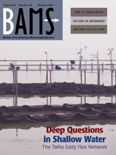
BULLETIN OF THE AMERICAN METEOROLOGICAL SOCIETY
Pioneering research that shapes our understanding of the skies.BULLETIN OF THE AMERICAN METEOROLOGICAL SOCIETY, published by the American Meteorological Society, stands as a premier forum in the field of meteorology and atmospheric science, boasting an impressive ranking in the Q1 category for 2023. With a long-standing history dating back to 1972, this journal serves as a vital resource for researchers, practitioners, and students dedicated to advancing the understanding of atmospheric phenomena. The journal facilitates the dissemination of cutting-edge research, innovative methodologies, and significant findings that propel the scientific community forward. Although not an Open Access journal, it remains a critical publication for comprehending complex environmental interactions, climate change, and weather-related phenomena. The BULLETIN OF THE AMERICAN METEOROLOGICAL SOCIETY is essential reading for anyone invested in atmospheric sciences, providing invaluable insights that shape policy, enhance safety, and promote environmental sustainability.
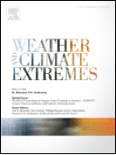
Weather and Climate Extremes
Shaping the Future of Climate Science through Open AccessWeather and Climate Extremes is a premier open access journal published by Elsevier, dedicated to advancing the understanding of extreme weather and climate phenomena from 2013 onwards. With an impressive impact factor, this journal ranks in the Q1 quartile across several categories including Atmospheric Science and Geography, Planning and Development, highlighting its significance in the field. The journal serves as a vital platform for researchers, professionals, and students, enabling them to disseminate their findings on climate variability, response strategies, and policy implications. Its accessibility ensures a wide reach, fostering collaboration and innovation while building a comprehensive repository of knowledge to address the challenges posed by climate extremes. The journal’s commitment to quality research is reflected in its Scopus rankings, with top placements across multiple disciplines, signaling its influence in shaping the discourse on climate and ecological management.